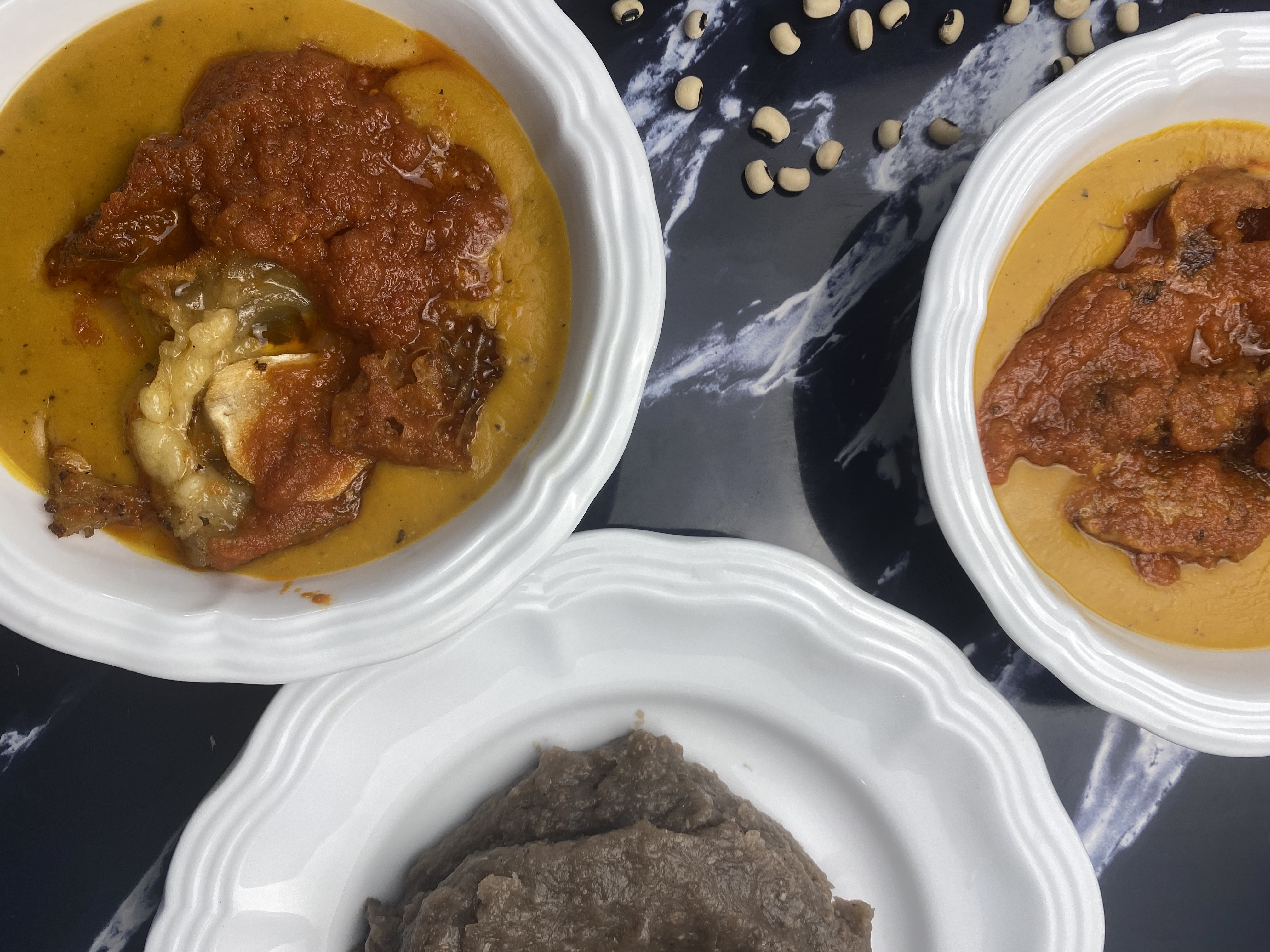Gbegiri, Hearty, Nutritious Bean Stew
Gbegiri is a nutritious, hearty bean stew and a favourite among the Yorubas in Nigeria. The delicious combo that comes with this in bukas (street restaurants), that is, amala and ewedu has placed this delicious bean stew amongst the favourites across Nigeria and beyond.
The main ingredient for gbegiri is beans. The first choice for most people is the blackeyed beans. However, use any beans you fancy that you can soak and take off the skin. In my family, the honey beans or oloyin in Nigeria was our preferred beans. We used this for moimoi, akara, gbegiri and any recipe that calls for beans. For this recipe, I used already peeled beans. You can find this in any African food shop.
Other ingredients for gbegiri includes palm oil, crayfish, dried fish, iru (locust beans), dried paprika and salt.
As you may have noticed, many of the stews and sauces from Africa, especially from the West and Central parts use palm oil. There has been a lot of negative narratives about palm oil. Palm oil, linked to deforestation, poor working conditions, displacement of communities, the list goes on. For the most part, these negatives are true because of greed and man's inhumanity to man. However, there is another side of the narrative often ignored, and it will be great looking at that other side, from the people where palm oil originated where those negative narratives do not apply. Please check out this post from the Food and Agriculture Organization, and watch the accompanying video, listening to the other side of the narrative before ever you decide to take out palm oil!
I will write a post on palm oil in the future where all of these issues will be addressed. Like any fat and oil, moderation is the key to a healthy lifestyle.
Gbegiri Recipe
Now, we have come to the best part of any recipe post. The how and what to do section. So, let's start cooking.
Gbegiri
|
Servings: 6 |
Prep Time: 2 hours |
Cooking Time: 30 min |
Ingredients
- 2 cups peeled beans
- 6 cups of chicken stock or any of choice. Try this is what I follow for most of my African stews.
- 1/4 cup palm oil
- 3 tablespoons crayfish
- 2-3 tablespoons dry and ground chilli pepper of choice
- salt to taste
Method
Soak beans in about 6 cups of water for an hour.
Drain the water after one hour, rinse in cold water and transfer to a pot with a lid. Pour in the chicken stock or any stock you have and cook over medium-high heat until beans are soft and tender which may take about an hour on the stove or 20minutes in an instant pot.
When beans are tender, transfer to high-speed blender and puree. Then, transfer the beans, back to the pot and cook on a stove. Pour in about half a cup water in a blender to rinse out all the pureed beans, into the pot.
Add all the other ingredients and cook on medium-low heat for about 20 to 25 minutes stirring stew occasionally until bean stew is to your desired consistency. Adjust seasoning and serve with amala.
Note: You have the option of cooking your meat and fish with this stew however, traditionally, you serve this with tomato stew with meat and fish Bon appetite whichever your choice.
If you are using an instant pot, you may transfer pureed beans and the rest ingredients back into the instant pot and use your slow cooker setting to cook for an hour or two on high.
Recipe provided by www.AfricanFoods.co.uk
Did you enjoy this post, Share your photos using the box above, or share on social media with #africanfoodieshare and tag us.
Never miss another like this, subscribe below:
Did You Try This Recipe Share Here Or Tag Us On Instagram?
Did you try this recipe? Always a great thing to share. Use #africanfoodieshare on twitter, Instagram and Facebook. Please share it!
Want regular updates on African cuisines and food recipes? What about unique health information about these foods - what to eat and avoid to keep healthy from the list of African recipes available?
Fill in the form below to subscribe to our Newsletter - AfricanFoods Weekly?
Worried about spamming? We are too. We will never ever give or pass on your information to anyone else. We will only use your email address to send you your copy of our weekly newsletter. We do have a zero tolerance to spam. We subscribe to a very strict policy on the handling and use of information we gather on this site! We also get paid for affiliate links on this site. See our privacy policy for further details.
Follow us on social media:
Get Our Weekly Newsletter. Subscribe Today. It's FREE.
Subscribe to African Foods Weekly
Get African food recipes, cooking tips, and healthy eating info delivered to your inbox every week. Simply fill in your email below and click SUBSCRIBE .
(Your information will not be shared)











New! Comments
Have your say about what you just read! Leave me a comment in the box below.